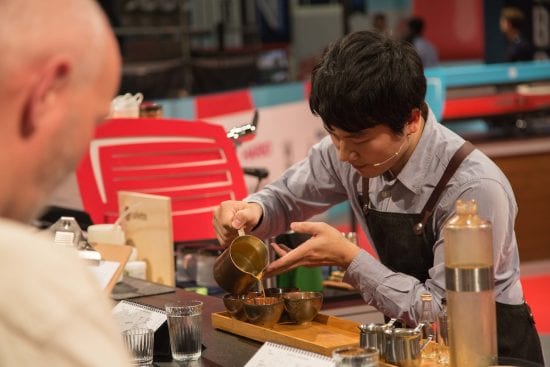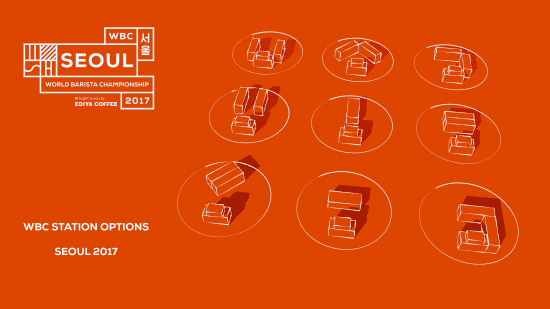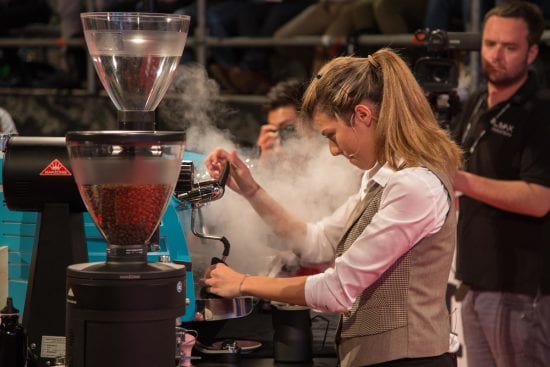
World Coffee Events announces changes to the 2017 World Barista Championship in Seoul, including new layouts, the elimination of technical judges beyond the first round, and more baristas advancing at the semi-finals.
BY ASHLEY RODRIGUEZ
BARISTA MAGAZINE ONLINE
Photos courtesy of World Coffee Events
Today, World Coffee Events (WCE) released its set of changes to the 2017 World Barista Championship (WBC) set to happen in Seoul in November and they are a doozy. WCE worked with a group of past champions and judges—called the WBC Evolution Working Group—to amend, delete, and add new rules. They have now released a revised rulebook along with a 14-page document outlining all the changes.
“Celebrating innovative production and service is also a core value in competition, especially as rounds progress,” a press statement from the WCE notes. “To better balance these values and create new opportunities for competition progression, in 2017, for the first time, competition format changes are being introduced for use exclusively at the World Barista Championship level, with National Championships continuing with a shared common format.” So you won’t be seeing any of these new rules implemented until November, but the result will be a new-look World Barista Championship that is a different—albeit related—competition meant to push national champions to be inventive and broaden their ability to try new things for the judges. “Our intention is to create a positive difference between national competitions and the WBC. The central narrative of the two will always correlate, and the two formats reward the same principles,” said members of the WBC Evolution Working Group.
So what can you expect to see? Some of the most striking changes have to do with the format of the competition. “A lot of anguish, heartache, and discussion went into every rule change, but none more so than the simultaneous competition rounds,” said Alex Bernson, WCE Brand Manager. In the past, the first round of competition would stretch two days with over 30 competitors on each day, with competitors, runners, and staff working 12+ hour days. “There’s over 60 people who will come represent their nation and that’s a whole lot of baristas,” Alex shares, so now competitors will have staggered start times—which means there will be multiple competitors on stage, performing their routines simultaneously time during round one. “The resulting running schedule is more accessible for everyone, including competitors, volunteers, spectators, and staff,” the press release states. In order to make this work logistically, competitors during the first round will perform to a pre-set audio mix to be determined by the WCE. Competitors will be able to choose their music again in the semi-final and final rounds. Every competitor will still have their individual routine live streamed, along with their post-competition interview available in full.

In acknowledging the evolution of the competition and the growing number of national champions, the working group has also opted to open up semi-finals to include the top 15 performers plus a wildcard 16th spot—up from the top 12 in 2016. The 16th wildcard spot will be given to the winner of the WBC team competition’s highest scorer who is not in the top 15. “Each competing nation is placed in a team based on historical performance data, with each competitor giving their own individual stage routines, while supporting and working with each other off-stage,” the press release states. The team competition was new to WBC last year, and this rule changes gives weight to team competition, which encourages competitors to come together and support their fellow baristas. Along with the wildcard position, teams will also have to do a two-hour coffee service of a coffee, to be chosen from a preselected group of coffees provided by WCE, to share their skill with attendees of the competition and trade show.

For the semi-final round, judges will shift their focus from technical skills to sensory—there will be no technical judges during the semi-final and final rounds of the WBC. “Allowing for changes as competitors move through the competition rounds opens up many possibilities, and we are excited to see what the new WBC possibilities bring,” the working group shared. This rule change is meant to allow for creativity on the part of the competitors, along with acknowledging that to get to this level, these baristas have already displayed technical mastery.
Perhaps the most creative—and most visible—change to the WBC will be how the judges’ table and prep station table can be modified. “The layout of the presentation stage will no longer be set—competitors will now be able to select from nine new table configurations, with multiple height & seating options,” the press release states. Judges can be sat at any of the tables besides the table with the machine, and the competitor has the option to have the judges sit on stools, low chairs, or to stand. Full photos and dimensions of the tables will be available June 1. Baristas will also have more control of their espresso machines and will have them set to their preferred temperature prior to competition.

As for how the WCE and the working group envision these changes being received or actualized, they’re taking a bit of a “wait and see” approach. “There have been so few changes to the World Barista Championship, relatively speaking, for awhile, that people have really figured out the competition. The range of available things to be amazing at could be improved. These changes create a whole new spectrum of which someone can do something innovative or wild or unexpected on the world barista stage,” Alex shares.
It’s unclear what changes will resonate the most, but the working group and the WCE are excited to see what competitors do and anticipate a lot of interesting interpretations and forward-thinking ideas. “I have no idea what people are going to do with these layouts. Maybe it’s not going to matter at all,” shares Alex, “but [the working group] got to this point where they were making all these changes that they were convinced needed to happen at the world level to make worthwhile progress and give people new opportunities.” Every change and modification went through careful and critical debate with each member of the working group, and each rule change reflects ideas from past top competitors and judges who hope to make the competition better and more innovative for future competitors.

This won’t be the end of changes to the WBC, and some, based on how things go at Seoul, might trickle down to the national competitions. “There is every possibility that following the success of the 2017 changes, more changes will evolve and the national body competitions will continue to vary from the WBC,” the working board notes. “We are however very aware that the national body competitions are the road to the WBC and they have a huge scope. Analyzing the success, value, and production needs of the 2017 WBC format progressions will drive the consideration of how to best integrate and sync evolutions in the 2018 WBC and 2018 National competitions.” At the world level, the WBC hopes to find the best baristas and create a format allowing them to express their skill and creativity, while being as inclusive as possible of the growing global specialty community, and hopes these rule changes will allow for more freedom and community to develop.

